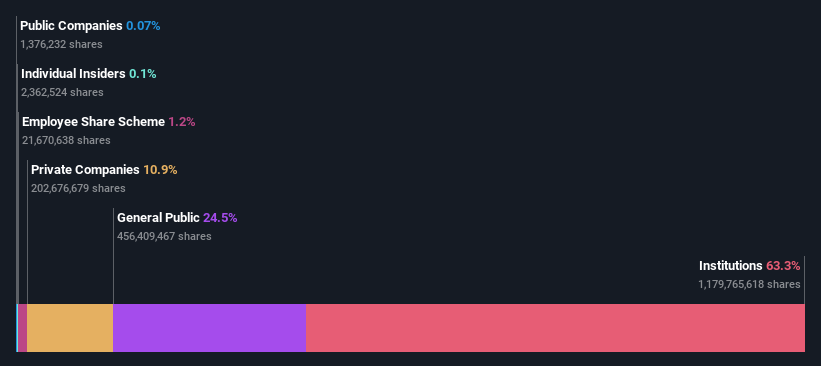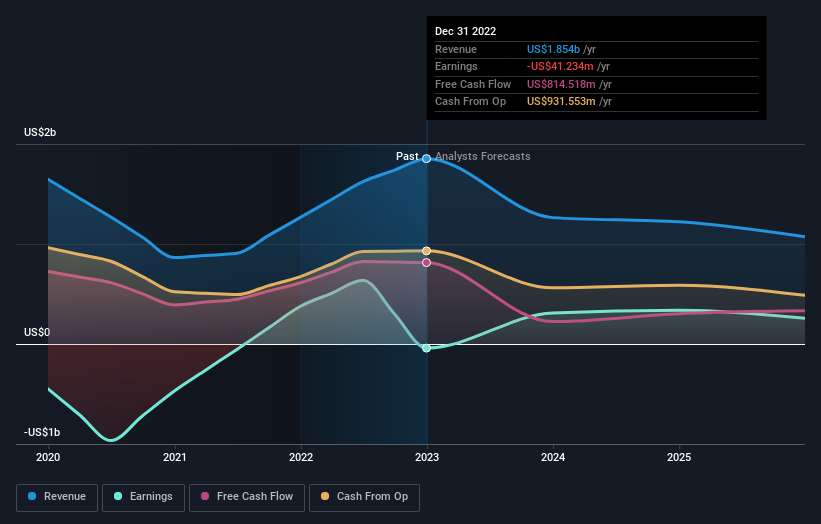- United Kingdom
- /
- Oil and Gas
- /
- LSE:ENQ
EnQuest PLC's (LON:ENQ) recent 10% pullback adds to one-year year losses, institutional owners may take drastic measures

Key Insights
- Given the large stake in the stock by institutions, EnQuest's stock price might be vulnerable to their trading decisions
- 51% of the business is held by the top 12 shareholders
- Ownership research along with analyst forecasts data help provide a good understanding of opportunities in a stock
To get a sense of who is truly in control of EnQuest PLC (LON:ENQ), it is important to understand the ownership structure of the business. With 63% stake, institutions possess the maximum shares in the company. Put another way, the group faces the maximum upside potential (or downside risk).
And institutional investors saw their holdings value drop by 10% last week. This set of investors may especially be concerned about the current loss, which adds to a one-year loss of 50% for shareholders. Often called “market makers”, institutions wield significant power in influencing the price dynamics of any stock. As a result, if the downtrend continues, institutions may face pressures to sell EnQuest, which might have negative implications on individual investors.
Let's delve deeper into each type of owner of EnQuest, beginning with the chart below.
See our latest analysis for EnQuest

What Does The Institutional Ownership Tell Us About EnQuest?
Many institutions measure their performance against an index that approximates the local market. So they usually pay more attention to companies that are included in major indices.
EnQuest already has institutions on the share registry. Indeed, they own a respectable stake in the company. This can indicate that the company has a certain degree of credibility in the investment community. However, it is best to be wary of relying on the supposed validation that comes with institutional investors. They too, get it wrong sometimes. It is not uncommon to see a big share price drop if two large institutional investors try to sell out of a stock at the same time. So it is worth checking the past earnings trajectory of EnQuest, (below). Of course, keep in mind that there are other factors to consider, too.

Institutional investors own over 50% of the company, so together than can probably strongly influence board decisions. Hedge funds don't have many shares in EnQuest. Double A Ltd is currently the largest shareholder, with 11% of shares outstanding. Meanwhile, the second and third largest shareholders, hold 8.3% and 5.7%, of the shares outstanding, respectively.
A closer look at our ownership figures suggests that the top 12 shareholders have a combined ownership of 51% implying that no single shareholder has a majority.
Researching institutional ownership is a good way to gauge and filter a stock's expected performance. The same can be achieved by studying analyst sentiments. There are plenty of analysts covering the stock, so it might be worth seeing what they are forecasting, too.
Insider Ownership Of EnQuest
The definition of company insiders can be subjective and does vary between jurisdictions. Our data reflects individual insiders, capturing board members at the very least. Company management run the business, but the CEO will answer to the board, even if he or she is a member of it.
Most consider insider ownership a positive because it can indicate the board is well aligned with other shareholders. However, on some occasions too much power is concentrated within this group.
Our data suggests that insiders own under 1% of EnQuest PLC in their own names. However, it's possible that insiders might have an indirect interest through a more complex structure. It appears that the board holds about UK£353k worth of stock. This compares to a market capitalization of UK£279m. We generally like to see a board more invested. However it might be worth checking if those insiders have been buying.
General Public Ownership
With a 24% ownership, the general public, mostly comprising of individual investors, have some degree of sway over EnQuest. While this size of ownership may not be enough to sway a policy decision in their favour, they can still make a collective impact on company policies.
Private Company Ownership
We can see that Private Companies own 11%, of the shares on issue. Private companies may be related parties. Sometimes insiders have an interest in a public company through a holding in a private company, rather than in their own capacity as an individual. While it's hard to draw any broad stroke conclusions, it is worth noting as an area for further research.
Next Steps:
I find it very interesting to look at who exactly owns a company. But to truly gain insight, we need to consider other information, too.
Many find it useful to take an in depth look at how a company has performed in the past. You can access this detailed graph of past earnings, revenue and cash flow.
But ultimately it is the future, not the past, that will determine how well the owners of this business will do. Therefore we think it advisable to take a look at this free report showing whether analysts are predicting a brighter future.
NB: Figures in this article are calculated using data from the last twelve months, which refer to the 12-month period ending on the last date of the month the financial statement is dated. This may not be consistent with full year annual report figures.
If you're looking to trade EnQuest, open an account with the lowest-cost platform trusted by professionals, Interactive Brokers.
With clients in over 200 countries and territories, and access to 160 markets, IBKR lets you trade stocks, options, futures, forex, bonds and funds from a single integrated account.
Enjoy no hidden fees, no account minimums, and FX conversion rates as low as 0.03%, far better than what most brokers offer.
Sponsored ContentValuation is complex, but we're here to simplify it.
Discover if EnQuest might be undervalued or overvalued with our detailed analysis, featuring fair value estimates, potential risks, dividends, insider trades, and its financial condition.
Access Free AnalysisHave feedback on this article? Concerned about the content? Get in touch with us directly. Alternatively, email editorial-team (at) simplywallst.com.
This article by Simply Wall St is general in nature. We provide commentary based on historical data and analyst forecasts only using an unbiased methodology and our articles are not intended to be financial advice. It does not constitute a recommendation to buy or sell any stock, and does not take account of your objectives, or your financial situation. We aim to bring you long-term focused analysis driven by fundamental data. Note that our analysis may not factor in the latest price-sensitive company announcements or qualitative material. Simply Wall St has no position in any stocks mentioned.
About LSE:ENQ
EnQuest
An oil and gas production and development company, explores, extracts, and produces hydrocarbons in the United Kingdom, North Sea, and Malaysia.
Slight and fair value.
Similar Companies
Market Insights
Community Narratives



